【2022中考英语一轮教材专题复习】外研七年级下册 Modules 1-3课件(给你个101张PPT)
文档属性
| 名称 | 【2022中考英语一轮教材专题复习】外研七年级下册 Modules 1-3课件(给你个101张PPT) |  | |
| 格式 | pptx | ||
| 文件大小 | 3.5MB | ||
| 资源类型 | 试卷 | ||
| 版本资源 | 外研版 | ||
| 科目 | 英语 | ||
| 更新时间 | 2022-02-12 21:04:32 | ||
图片预览

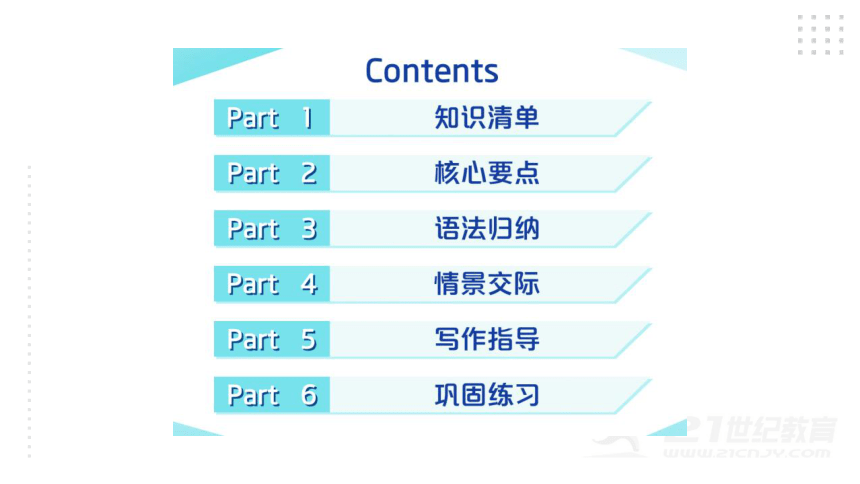
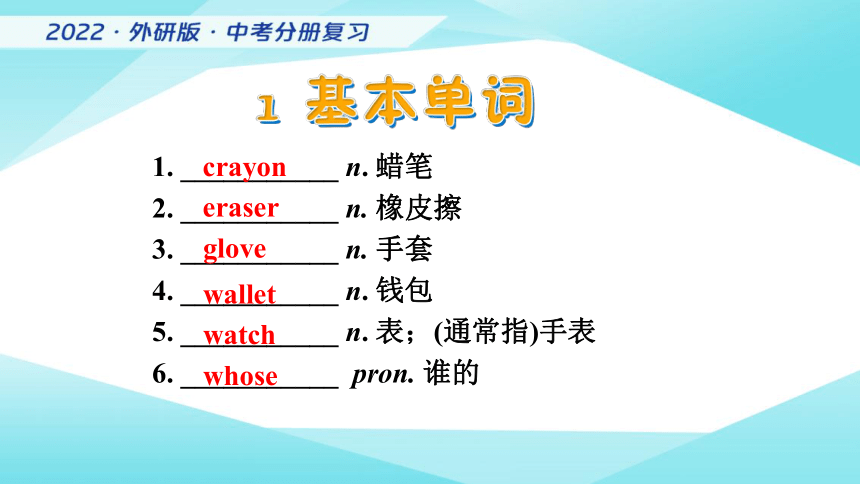
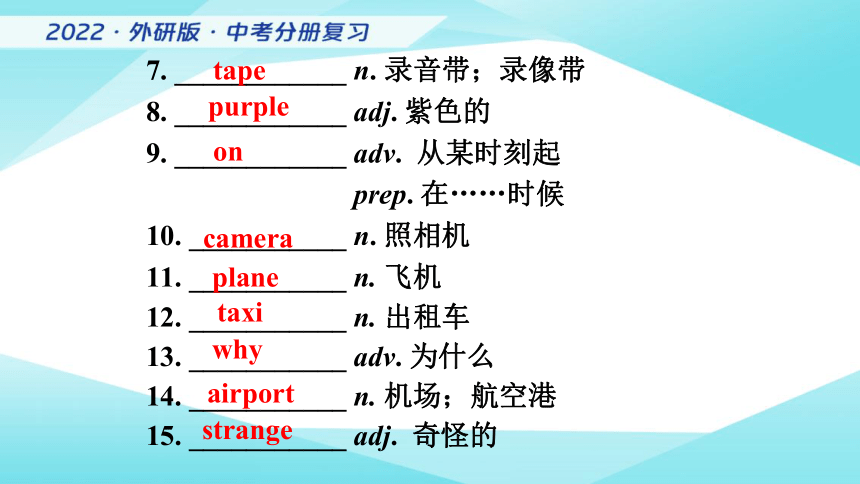
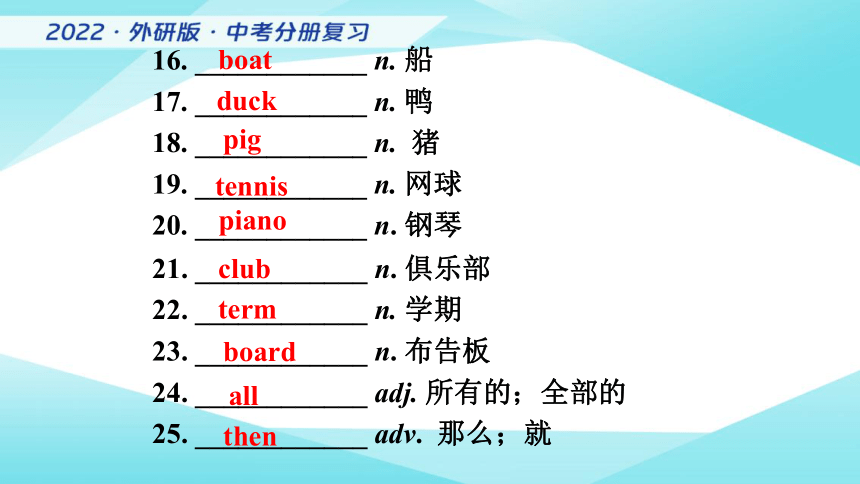
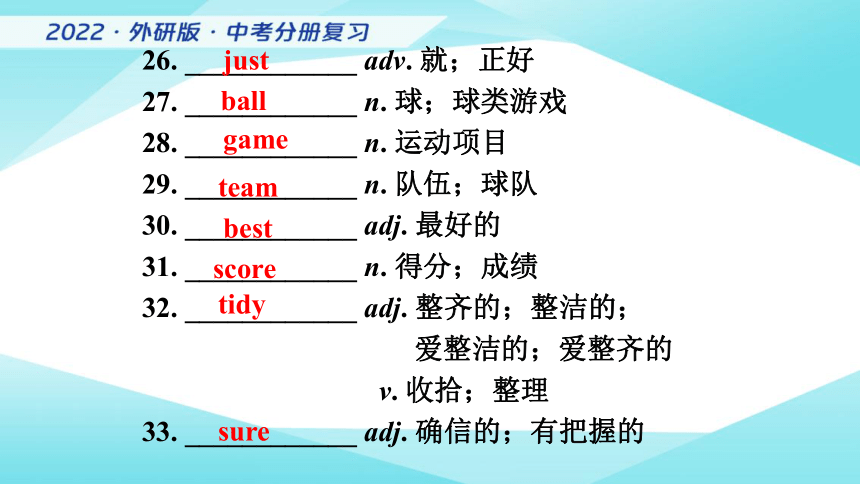
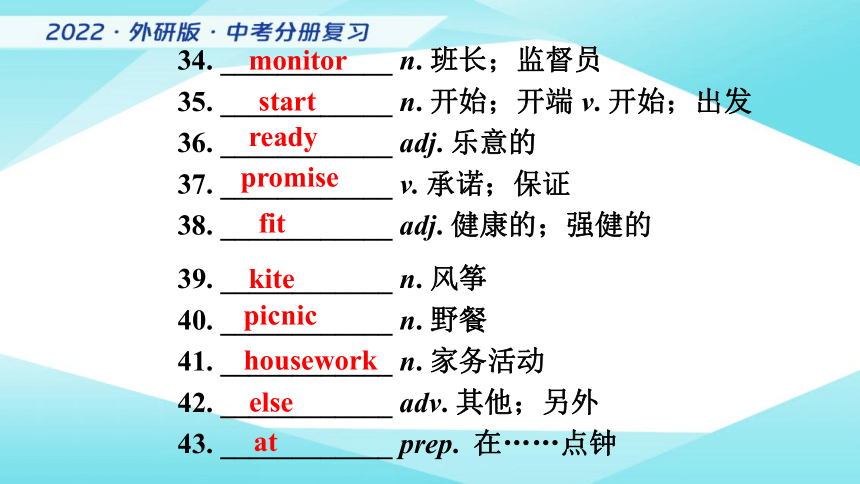
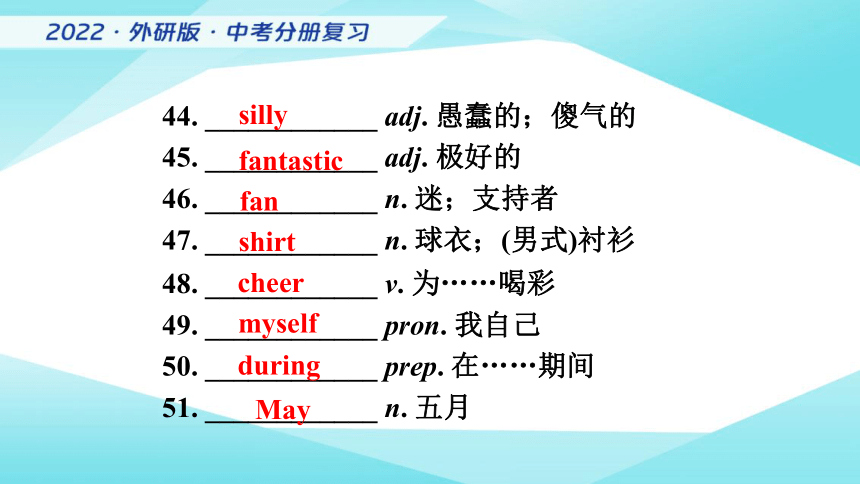
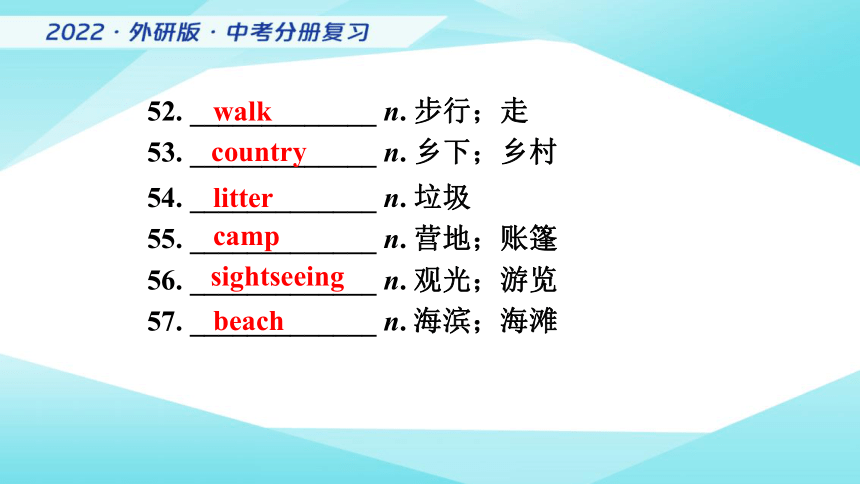
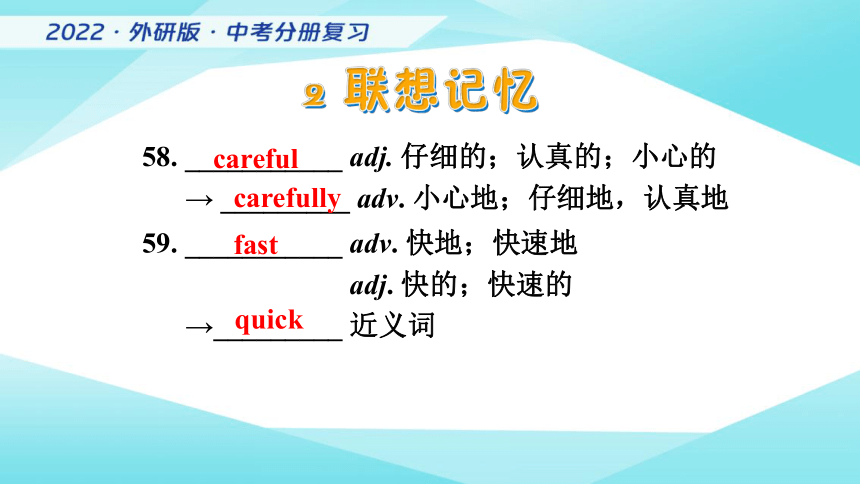
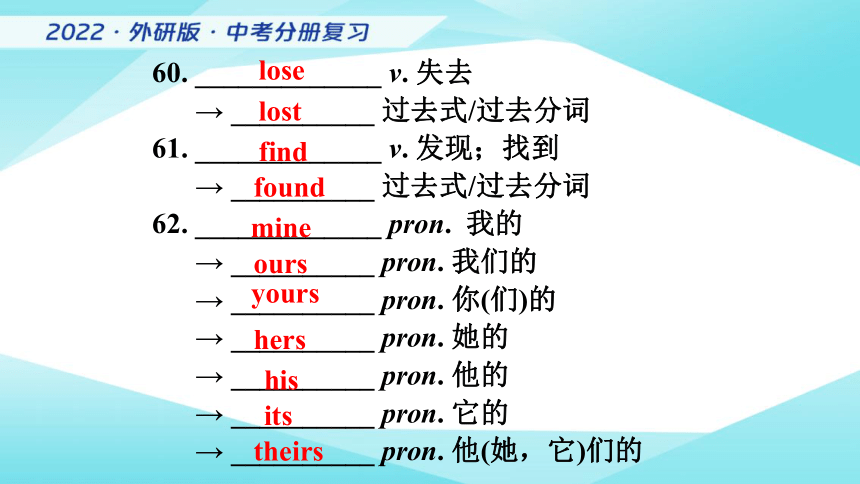
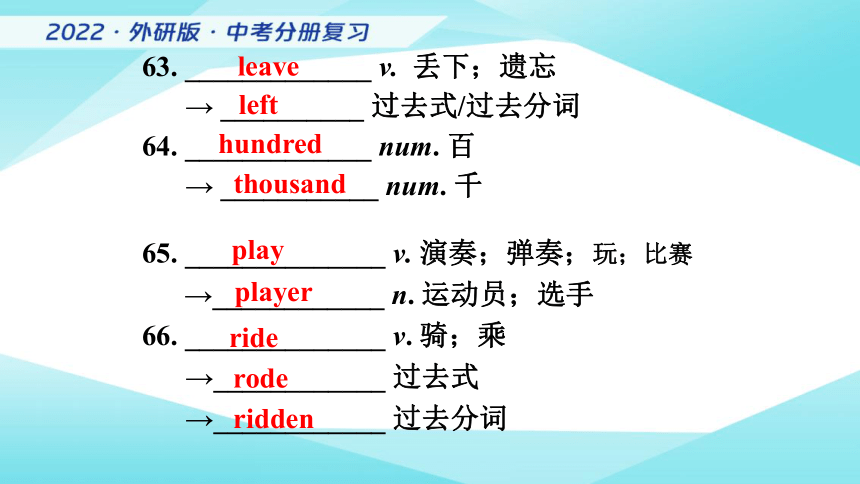
文档简介
(共101张PPT)
外研版七年级下册
Modules 1-3
Presentation
1. ___________ n. 蜡笔
2. ___________ n. 橡皮擦
3. ___________ n. 手套
4. ___________ n. 钱包
5. ___________ n. 表;(通常指)手表
6. ___________ pron. 谁的
crayon
eraser
wallet
glove
watch
whose
7. ____________ n. 录音带;录像带
8. ____________ adj. 紫色的
9. ____________ adv. 从某时刻起
prep. 在……时候
10. ___________ n. 照相机
purple
on
camera
tape
11. ___________ n. 飞机
12. ___________ n. 出租车
13. ___________ adv. 为什么
14. ___________ n. 机场;航空港
15. ___________ adj. 奇怪的
plane
taxi
why
airport
strange
16. ____________ n. 船
17. ____________ n. 鸭
18. ____________ n. 猪
19. ____________ n. 网球
20. ____________ n. 钢琴
boat
duck
pig
tennis
piano
21. ____________ n. 俱乐部
22. ____________ n. 学期
23. ____________ n. 布告板
24. ____________ adj. 所有的;全部的
25. ____________ adv. 那么;就
club
board
all
term
then
26. ____________ adv. 就;正好
27. ____________ n. 球;球类游戏
28. ____________ n. 运动项目
29. ____________ n. 队伍;球队
30. ____________ adj. 最好的
31. ____________ n. 得分;成绩
32. ____________ adj. 整齐的;整洁的;
爱整洁的;爱整齐的
v. 收拾;整理
33. ____________ adj. 确信的;有把握的
team
best
score
tidy
just
ball
game
sure
34. ____________ n. 班长;监督员
35. ____________ n. 开始;开端 v. 开始;出发
36. ____________ adj. 乐意的
37. ____________ v. 承诺;保证
38. ____________ adj. 健康的;强健的
monitor
start
ready
fit
promise
39. ____________ n. 风筝
40. ____________ n. 野餐
41. ____________ n. 家务活动
42. ____________ adv. 其他;另外
43. ____________ prep. 在……点钟
picnic
else
kite
at
housework
44. ____________ adj. 愚蠢的;傻气的
45. ____________ adj. 极好的
46. ____________ n. 迷;支持者
47. ____________ n. 球衣;(男式)衬衫
silly
fantastic
fan
shirt
48. ____________ v. 为……喝彩
49. ____________ pron. 我自己
50. ____________ prep. 在……期间
51. ____________ n. 五月
myself
cheer
during
May
52. _____________ n. 步行;走
53. _____________ n. 乡下;乡村
walk
country
54. _____________ n. 垃圾
55. _____________ n. 营地;账篷
56. _____________ n. 观光;游览
57. _____________ n. 海滨;海滩
camp
beach
litter
sightseeing
58. ___________ adj. 仔细的;认真的;小心的
→ _________ adv. 小心地;仔细地,认真地
careful
carefully
59. ___________ adv. 快地;快速地
adj. 快的;快速的
→_________ 近义词
quick
fast
60. _____________ v. 失去
→ __________ 过去式/过去分词
61. _____________ v. 发现;找到
→ __________ 过去式/过去分词
62. _____________ pron. 我的
→ __________ pron. 我们的
→ __________ pron. 你(们)的
→ __________ pron. 她的
→ __________ pron. 他的
→ __________ pron. 它的
→ __________ pron. 他(她,它)们的
lose
lost
find
found
mine
yours
hers
his
ours
its
theirs
63. _____________ v. 丢下;遗忘
→ __________ 过去式/过去分词
64. _____________ num. 百
→ ___________ num. 千
leave
left
hundred
thousand
65. ______________ v. 演奏;弹奏;玩;比赛
→____________ n. 运动员;选手
66. ______________ v. 骑;乘
→____________ 过去式
→____________ 过去分词
play
ride
rode
ridden
player
67. _____________ v. 焦虑;担心
→___________ adj. 担心的
68. _____________ v. 教;讲授
→___________ 过去式/过去分词
→___________ n. 教师
teach
worry
worried
taught
teacher
69. _____________ v. 游泳
→___________ 过去式
→___________ 过去分词
→___________ n. 游泳
swum
swimming
swim
swam
70. _____________ pron. 每个人
→___________ pron. 任何人
→___________ pron. 某人;有人
→___________ pron. 没有人
71. _____________ adj. 美的;美丽的
→___________ adv. 美丽地
→___________ n. 美人;美丽
72. _____________ v. 放飞;飞行;乘飞机
→___________ 过去式
→___________ 过去分词
somebody
beautiful
beautifully
beauty
everybody
anybody
fly
flew
flown
nobody
73. _____________ pron. 没有什么;没有东西
→___________ pron. 某事物
→___________ pron. 任何事
74. _____________ adv. 面向未来的;向前
→___________ adv. 向后的 (反义词)
forward
nothing
something
anything
backward
75. _____________ v. 希望
→___________ (同义词)
76. _____________ v. 赢;获胜
→___________ 过去式/过去分词
hope
wish
win
won
77. _____________ adv. 迟;晚
adj. 迟的;晚的
→___________ adv. 早;提前 adj. 早的
78. _____________ num. 第二
→___________ num. 第一
→___________ num. 第三
79. _____________ v. 收集
→___________ n. 收藏品
second
third
late
early
collect
first
collection
80. _____________ n. 娱乐;乐趣
→___________ adj. 可笑的;有趣的
81. _____________ adj. 澳大利亚的
→___________ n. 澳大利亚
Australian
Australia
fun
funny
1. _________________ 小心(对待)……
2. _________________ 打电话……给某人
3. _________________ 选某人当……
4. _________________ 过得愉快
5. _________________ 首先;第一
6. _________________ 放风筝
7. _________________ 从现在开始
8. _________________ 与某人相处融洽
be careful with ...
call sb. at ...
choose sb. as ...
enjoy oneself
first of all
fly a kite
from now on
get on well with sb.
9. ________________ 复习;练习
10. _______________ 观光
11. _______________ 去野餐
12. _______________ 几百;成百上千
13. _______________ 匆匆忙忙
14. _______________ 在乡下
15. _______________ 正如;正像
16. _______________ 寻找
17. _______________ 盼望
go over
go sightseeing
have a picnic
hundreds of
in a hurry
in the country
just like
look for
look forward to
18. __________________ 失物招领箱
19. __________________ 失物招领处
20. __________________ 交朋友
21. __________________ 五一劳动节
22. __________________ 移动电话;手机
23. __________________ 在海滩上
24. __________________ 保证做某事
25. __________________ 乐于做某事
lost and found box
lost and found office
make friends
May Day
mobile phone
on the beach
promise to do sth.
ready to do sth.
26. ________________ 在校队
27. ________________ 和某人待在一起
28. ________________ 仅此而已
in the school team
stay with sb.
that’s all
29. ________________ 骑自行车
30. ________________ 暑假
31. ________________ 散步
32. ________________ 担心……
33. ________________ 想要;希望
34. ________________ 在周末
35. ________________ 打扫卫生
36. ________________ 去游泳
37. ________________ 帮助某人做某事
38. ________________ 帮助做某事
ride a bike
summer holiday
take a walk
worry about ...
would like
at the weekend
do cleaning
go swimming
help sb. (to) do sth.
help with sth.
1. —Whose bag is this
—It’s mine.
2. —Are these crayons yours
—Yes, they are. / No, they aren’t.
3. Here’s a purple wallet!
4. I think it’s Betty’s.
5. Here are some nice gloves.
6. That’s why there are lost and found offices at airports and stations.
7. There are about a hundred bikes and a large boat.
8. Don’t worry about Chinese.
9. I’m sure everybody would like a clean classroom, just like home.
10. What are you going to do at the weekend
11. Who else is going to be there
12. —Would you like to join us
—Yes, I’d love to.
13. It’s going to be a fantastic weekend!
后面既可以跟失去的事物,也可以跟输掉的比赛等。
e.g. Lily lost her bike last week.
I hope we won’t lose the basketball match tomorrow.
1. lose v. 失去; 失败 (lost, lost)
【语境应用】将下列汉语句子翻译为英语。
1) 我弟弟昨天丢了一支钢笔。
2) 哪支队输掉了那场比赛?
My brother lost a pen yesterday.
Which team lost the match
lose短语
lost and found box / office
失物招领箱/处
lose face 丢脸
lose heart
灰心,泄气
lose weight
减肥
lose interest
失去兴趣
lose one’s balance
失去平衡
lose sight of
看不见
lose touch / contact with
与……失去联系
2. find v. 发现;找到
find, find out, look for
find 强调找的结果
find out 找出;发现;查明,指通过观察、探索或调研之后搞清楚、弄明白事情的真相
look for 寻找,强调找的过程
【语境应用】用find out, find或look for的适当形式填空。
1) Sam __________ his pen everywhere, but he couldn’t
________ it anywhere.
2) She lost her mother’s favorite book, but she didn’t want her mother to ________.
looked for
find
find out
3)【中考链接】If buildings fall down with people inside, the snake robots can help ______ people under the buildings. (2020山东菏泽)
A. take up B. look for C. cut up
B
3. leave v. 丢下;遗忘;离开、出发
【归纳】
leave behind 留下;把……抛在后面
leave ... alone 让……一个人待着
leave for 动身到(某处)
forget 忘记,忘记某人、物或事。反义词remember
leave 忘了带;丢下,常和地点搭配,leave+物品+地点:把某物遗忘在某处
forget, leave
【语境应用】将下列汉语句子翻译成英语。
1) 我下周动身去伦敦。
2) 我把包丢在公共汽车上了。
3) 他昨天离开了上海。
I am leaving for London next week.
I left my bag on the bus.
He left Shanghai yesterday.
4. careful adj. 仔细的;认真的;小心的
作定语,修饰人或物;用在be动词后作表语。
【归纳】
be careful 小心,可单独成句,表示劝诫或者警告
be careful with ... 小心(对待)……
be careful to do sth. 小心做某事
be careful of/ about sth. 当心某物,留意某物
【语境应用】完成句子
1) 小心!它很危险。
________ ________! It’s very dangerous.
2) 她对她的孩子很小心。
She ________ ________ ________ her children.
Be careful
is careful with
【中考链接】
1. The boy is so _______ that he makes few mistakes in English grammar. (2021辽宁铁岭、葫芦岛)
A. strict B. careful C. active D. patient
B
2. During the exam, ______ you are, ______ mistakes you’ll make. (2021广西贺州)
A. the more careful; the less
B. the more careful; the fewer
C. the more careless; the less
D. the more careless; the fewer
B
5. play v. 演奏;弹奏
【归纳】
词义 及物 / 不及物动词 用法及例子
打 / 踢 (球) 及物动词 play+球类名词
如:play basketball / soccer
弹;吹奏;演奏 及物动词 play+the+乐器名词
如:play the piano
词义 及物 / 不及物动词 用法及例子
下(棋); 打(牌) 及物动词 play+棋牌类名词
如:play chess; play cards
玩 不及物动词 单独使用,或用于play with ... 中。
如:Let’s play.
They play with a ball after class.
【语境应用】单项选择
—Tina, are you going to play _________
football on School Day
—Yes, and I’ll also play _________ piano that
afternoon.
A. the; the B. the; / C. /; the
C
6. worry v. 焦虑;担心
n. 烦心的事(可数名词);烦恼;忧虑(不可数名词)
【归纳】
worry about sb. /sth. 为某人/某事担心
worry sb. with sth. 用某事去麻烦某人
【拓展】
worried adj. 烦恼的;焦虑的;担忧的
be worried about = worry about 为……发愁;为……担心
【语境应用】用worry的适当形式填空。
1) The mother is always _______ about her little son when she is out.
2) Too much _______ has made the young man look like an old man.
3) But they now have a few new _______.
worried
worry
worries
【中考链接】
—You look so ______. What’s wrong
—I can’t find my mobile phone. (2020辽宁营口)
A. tired B. relaxed C. excited D. worried
D
7. ready adj. 乐意的;准备好的
【归纳】
be ready to 准备好(做某事);愿意(做某事)
get ready to do sth. 准备好做某事
=be / get ready for 为……做好准备
【语境应用】一句两译。
我正准备上学。
I am getting ready to go to school.
I am getting ready for school.
8. promise v. 承诺;保证
【归纳】
promise to do sth. 保证/承诺做某事
promise sth. to sb. = promise sb. sth.
向某人承诺某事;承诺给某人某物
promise sb.+从句 承诺/答应某人……
【拓展】
n. 承诺;诺言
make a promise (to sb.) (向某人)许下诺言
keep one’s promise 信守诺言
break one’s promise 违背诺言
【语境应用】完成句子。
1) 如果你许下诺言,你就应该遵守它。
If you ______ ______ _______, you should keep it.
2) 我承诺我将不玩电脑游戏了。
I _______ ______ I’ll never play computer games.
3) 刚才他们承诺遵守规则。
They ________ ______ ______ the rules just now.
make a promise
promise that
promised to follow
4) 上周她向我承诺她会帮助我学英语。
Last week she _________ ______ ______ she would help me with my English.
promised me that
【中考链接】
Our national hero Yue Fei ________ to devote (贡献) himself to the country at a young age.
(2021辽宁抚顺、本溪、辽阳)
A. failed B. forgot C. promised D. refused
C
9. fast adj. 快的;快速地
adv. 快地;快速地
fast 可用作形容词,又可用作副词。它主要指人或物体本身的速度快或动作快。
rapid 正式用语,只用作形容词,语气较强,常用于表示抽象意义的“快速的”。
quick 可用作形容词,又可用作副词。既可指速度快,也可指反应快、动作敏捷。
fast, rapid, quick
【语境应用】用rapid, fast或quick的适当形式完成各题。
1) Our country has made ________ development.
2) Tom is ________ at learning English.
3) Don’t speak too ________. I can’t follow you.
4) The train is going _______ and _______.
rapid
quick
fast
faster faster
10. nothing pron. 没有什么;没有东西
形容词修饰不定代词,放在不定代词之后做定语。
nothing, something, anything, everything
nothing 否定词:没有任何东西;没有事=not anything
something 指某事或某物,多用于肯定句中,也可用在表邀请、请求或期望得到肯定回答的疑问句中
anything 表示某事物时常用在疑问句中,还可以用在否定句中:任何事物;任何东西
everything 每件事物;所有事物
【中考链接】
1) —Amazing! Tom got the best grade in the test last week.
—_______ is impossible. He studies really hard online
this term. (2020湖北黄冈)
A. Anything B. Nothing
C. Everything D. Something
2) —Don’t play games any more. There’s _______ for you.
—OK, Mom. (2020湖南郴州)
A. nothing useful B. useful nothing C. something useful
B
A
3) —What did Chinese President Xi Jinping say during
the epidemic (疫情)
—________ is more important than people’s safety
and health. (2020湖北宜昌)
A. Nothing B. Everything
C. Something D. Anything
A
11. cheer v. 为……喝彩,后接人
【拓展】
cheer (sb.) up (使)(某人)高兴起来;(使)(某人)振作起
来,可用于句首,表示对他人的鼓励。
【语境应用】完成句子
1) 我们打算为中国运动员加油。
We are going to ________ Chinese players.
2) Jenny现在很难过,我想去安慰一下她。
Jenny is sad now. I want to _________ _________ _________.
3) 振作起来!咱们明天去公园吧。
_________ _________! Let’s go to the park tomorrow.
cheer
cheer her up
Cheer up
【中考链接】
—What's up She looks so upset.
—She failed the exam. Let's _______. (2021四川自贡)
dress her up
B. cheer her up
C. make her up
B
12. win v. 获胜;赢;赢得
win, beat
win 赢得比赛、竞赛、奖牌、奖品等,常和match, competition, game, medal, prize等词搭配。
beat 打败,通常和表示人、球队、对手等的词搭配。
【语境应用】用win或beat的适当形式填空。
1) I am sure you can ________ the speech competition.
2) They stood up and clapped for Tom because he ________ the race.
3) We ________ them at chess.
win
won
beat
13. hope v. 希望
hope to do sth. (某人)希望做某事
注意:
(某人)希望某人做某事:sb. hope + that sb. do sth.
e.g. We hope to come to your school again.
I hope she will like the flowers.
1. from now on 从现在开始, 常用于一般将来时
【拓展】
from then on 从那时起, 常用于一般过去时
【语境应用】翻译句子。
1) 从现在起,我将努力学习。
2) Mary从那时起再也不跳舞了。
From now on I’ll study hard.
Mary didn’t dance any more from then on.
get 短语
get back 回来
get off 下车
get into
陷入;参与
get up
起床;起来
get out 出去
get ready
做好准备
get together 相聚
get on / along well with sb. 与某人和睦相处
2. get on 上车
【拓展】get短语
3. in a hurry 迅速,匆忙
【拓展】
hurry to do sth. 匆忙去做某事
hurry up 赶快;急忙(做某事)
no hurry 不忙,不必着急
【语境应用】完成句子
1) 赶快!他们准备好了。
________ ________! They are ready.
2) 他正匆忙下公交车。
He is getting off the bus ________
________ ________.
Hurry up
in
a hurry
【中考链接】
1) We mustn’t _______ the bus until it stops. (2020吉林)
A. get off B. put off C. turn off
2) You still have an hour left to go to the English party, so take your time, please. (同义句转换2020贵州黔西南州)
A. don’t hurry B. don’t go C. hurry up D. get up
A
A
4. go over 复习;练习
【拓展】go 短语
go up 增长;上升
go on 继续
go around 四处走动,流传
go by 经过;顺便走访
go down 下落,下沉
go away 离开
go out 出去,过时
go through 仔细检查,经历
go 短语
6. look forward to 盼望
to为介词,后面接动词时应该用动词-ing形式。
【拓展】look 短语
look after 照看,照顾
look at 朝……看,思考,考虑,研究
look for 寻找
look up 向上看,仰望,查找,检查
look
短语
【中考真题】
1) —Can I help you, sir
—Yes. I am ______ a coat. (2021广西柳州)
A. looking for B. looking through C. looking after
A
2) There is no need to _____ every new word in the dictionary when you are reading. (2021青海西宁)
A. look up B. look at C. look after D. look through
A
3) All children are _______ the day when they can go back
to school. (2020湖北孝感)
A. looking up B. taking care of
C. taking out D. looking forward to
D
7. hundreds of 成百上千的;数以百计的
注意:当hundred前有具体的数词时,要用hundred的单数形式,而且不和of连用。
【拓展】
thousands of 数以千计的
millions of 数以百万计的
1) In our school, every student has to choose a club to join, so about one ______ students have joined the Sports Club. (2021四川广元)
A. hundred of B. hundreds of
C. hundred D. hundreds
C
2) Our hometown is becoming more and more beautiful. ______ visitors come here on weekends. (2020四川内江)
A. Hundred B. Hundreds
C. Hundred of D. Hundreds of
D
C
3) —Chin is a great country with a history of about five ______ years.
— Yes. And _______ of foreigners come to visit it every year. (2021山东滨州)
A. thousand; thousand B. thousands; thousands
C. thousand; thousands D. thousands; thousand
1. Here’s a purple wallet!
倒装句。here, there等位于句首时,句子常用倒装结构。
当主语是名词时:Here / There+谓语+主语.;
当主语是代词时:Here / There+主语+谓语.
2. I’d like to join the Music Club because I can play the piano.
would like 愿意;想要
后可接名词(短语)或动词不定式;没有人称或数的变化;如果主语为人称代词,would可以缩写为’d。
would like to do sth. (语气较委婉)
=want to do sth. 想要做某事
would
Would you like sth.
询问对方是否想要某物。
肯定答语: Yes, please. / OK. / All right.
否定答语: No, thanks.
【归纳】
would like sb. to do sth.想要某人做某事
Would you like to do sth.
用来询问对方是否愿意做某事。
肯定答语: Yes, I’d like / love to.
否定答语: I’d like / love to, but ...
What would sb. like (to do)
用来询问对方或别人想要(做)什么。
【语境应用】 Ⅰ. 汉译英
你想要一碗牛肉面吗?
2) Tom不愿意和我下国际象棋。
3) 妈妈想让我早点回家。
Would you like a bowl of beef noodles
Tom would not like to play chess with me.
My mother would like me to go home early.
Ⅱ. 完成下列各题。
1) The girl would like some apple juice. (对划线部分提问)
2) I would like to go to the party this evening.
(改为一般疑问句并作肯定回答)
What would the girl like
—Would you like to go to the party this evening
—Yes, I’d like / love to.
物主代词 (Module 1)
表示所有关系的代词叫作物主代词。
物主代词分为两类:形容词性物主代词和名词性物主代词。
单数 形容词性物主代词 my your his her its
名词性物主代词 mine yours his hers its
复数 形容词性物主代词 our your their
名词性物主代词 ours yours theirs
名词性物主代词与形容词性物主代词的区别:
名词性物主代词=形容词性物主代词+名词。即:形容词性物主代词之后一定接名词,名词性物主代词之后不需接任何词。
e.g. My idea is quite different from hers. (hers=her idea)
情态动词 含义及用法 例句
can 表示能力:能, 会。可与be able to 相互转化。后跟动词原形。没有人称和数的变化。 Linda can speak Chinese smoothly.
表示请求、允许:可以。 Can we bring music players to school
情态动词can:能,能够 (Module 2)
情态动词 含义及用法 例句
can't 表示能力:不能,不会。 We should learn to save, because there are so many children who can't get enough food to eat.
表示否定推测,语气强烈:一定不,不可能,可能性几乎为零。 Miss Gao can't be in the classroom. I just saw her in the supermarket.
情态动词 含义及用法 例句
could can的过去式:能,会,表示过去的能力。 He couldn't find his keys yesterday morning.
在疑问句中表示委婉的请求。 Could you take a message for me
表推测:有可能,也 (20%~80%的可能性),语气缓和,较委婉。 I think the train to Beijing could be late.
时态 基本结构及时间标志词 一般将来时 结构 主语+will/shall/be going to+动词原形
标志词 1. tomorrow, soon, later
2. next week/month(next系列)
3. in a week, in 2022, in+一段时间
4. one day, in the future
一般将来时: (Module 3)
时态 常见用法及例句
一般将来时 1. will+动词原形,表示将来发生的动作或存在的状态。
eg Scientists believe that there will be more robots in
the future.
2. be going to+动词原形,计划、打算做某事,表示已经
决定、很可能发生的事,或有迹象表明要发生的事。
eg Look at the dark clouds. There is going to be a storm.
(客观迹象)
时态 常见用法及例句
一般将来时 3. be doing,常用于这种结构的动词有go, come, leave, stay, start, begin等,表示即将发生或安排好要做的事情。
eg I'm coming.
4. be about to+动词原形 & be to+动词原形:即将发生的动作。
eg The plane is about to take off.
5. 表示某种必然的趋势。
eg Fish will die without water.
6. 主将从现。
1. —Sam, _______ I join you in the community service
—Of course you can. (2021北京)
A. can B. must C. should D. need
2. What an amazing robot! It _______ cook more than 5,000 dishes. (2021江苏连云港)
A. shall B. need C. must D. can
A
情态动词can表示能够
D
3. —Hi, Carl! I’m leaving for Chengdu this weekend.
—Cool! But I ______ get away until the end of July.
(2021内蒙古呼和浩特)
A. shouldn’t B. can’t C. needn’t D. mustn’t
4. We ______ see which way to go if the stars do not twinkle (闪耀) so. (2021江苏扬州)
A. can not B. should not C. must not D. need not
B
A
1. Mike’s aunt is ______ English teacher. We all like ______. (2021天津)
A. our; she B. our; her C. we; she D. we; her
2. Mike moved to China with ______ family two years ago. (2021辽宁大连)
A. he B. him C. his D. himself
B
C
物主代词
3. —Is this Linda’s notebook
—No, it’s mine. The thick one on the desk is ______. (2021四川泸州)
A. she B. her C. hers D. herself
4. This isn’t my dictionary. ______ is over there, on the desk. (2021河北)
A. His B. Mine C. Hers D. Yours
B
C
1. You can borrow this film—surely you _______ watching it. (2021河北)
A. enjoy B. enjoyed C. will enjoy D. have enjoyed
2. There _______ an English show this weekend. Shall we go and watch it (2021新疆)
A. are going to be B. was C. will be D. were
一般将来时
C
C
3. —There ______ a basketball game against Class Two this Sunday.
—I see. I will come and cheer you on. (2021四川乐山)
A. will have B. is going to be C. is going to have
B
4. Don’t drink coffee before going to bed, or you ______ easily. (2021重庆B)
A. don’t fall asleep B. won’t fall asleep
C. didn’t fall asleep D. haven’t fallen asleep
B
一、能够和不能够(Ability and inability)
1. I can play the piano.
2. I'm really good at football.
3. You'll be able to buy anything on the Internet.
4. I can't speak Chinese very well.
5. Computers won't be able to do that.
二、意愿和打算(Intention and plan)
I’d like to join the Music Club.
We’re going to meet in the park at one o’clock.
I want / hope to find an English penfriend.
I’m not going to buy that book.
I’ll go with you.
I plan to go to Hangzhou this summer holiday.
I won’t see the movie again.
三、希望和愿望(Hope and wish)
I hope they win the match!
I’m looking forward to the football match tomorrow.
I wish to see you again.
I hope to become a doctor.
I hope so.
I hope not.
个人情况
【写作任务】
假如你是李华,想参加China Daily举办的以“梦想职业体验”为主题的2019年夏令营活动,请给主办人Mr. Smith写一封介绍个人情况的申请邮件。
内容包括:1. 个人信息与兴趣爱好
2. 梦想职业与个人计划
写作要求:
1. 词数90词左右,开头结尾已给出,不计入总词数。
2. 文中不得出现真实的学校名称与姓名。
【思路点拨】
1. 定基调
体裁:应用文——邮件;主体内容为说明文
时态:一般现在时
人称:第一人称
2. 谋布局、写句子
I’m interested in painting / I take / have / show an interest in painting
it always brings me much pleasure
I usually spend most of my free / spare time
drawing something
I can’t wait to join in /
take part in the activity
It is a great chance for me to experience the life as a painter
3. 巧衔接
本文体现了语义搭配这一衔接方式(通过词汇纽带来使上下文紧密连贯)。如本文中的 my name, ... years old, interested, hobby这些表达都与介绍个人情况相关联,从而使文章成为一个有机统一体。
4. 成篇章
Dear Mr. Smith,
It’s my pleasure to introduce myself to you.
My name is Li Hua. I’m 15 years old. I’m interested in painting. Painting is my only hobby and it always brings me much pleasure. I usually spend most of my free time drawing something. I want to be a great painter in the future. I plan to work harder on painting.
I’m excited when I learn about this activity. I can’t wait to join in the activity.
It is a great chance for me to experience the life as a painter.
I do hope to join in the activity and look forward to your reply.
Best wishes!
Yours sincerely,
Li Hua
5. 化平凡为非凡
It is said that Shen Nong discovered tea as a drink. Tea is one of the most popular drinks in China.
→It is said that Shen Nong discovered tea as a drink that is one of the most popular drinks in China.
Ⅰ. 根据语境及所给汉语提示语写出所缺单词。
1. I've ________(失去) the tickets for tonight's show.
2. She felt there was something ________(奇怪的) about Dexter's voice.
3. He ________(教) for several years before becoming a writer.
4. We decided to have a(n) ________(野餐) down by the lake.
5. Let's go back to ________(营地) — it's getting dark.
lost
strange
taught
picnic
camp
Ⅱ. 根据语境及所给首字母提示补全所缺单词。
1. My w________ seems to have stopped — it says 10:15 but I'm sure it must be later.
2. I don't think that I'm r________ for my driving test.
3. There's so much to do. I don't know where to s________.
4. Mum was angry with me because I l________ my 5-year-old sister alone at home.
5. Be c________ to look both ways when you cross the road.
watch
ready
start
left
careful
Ⅲ.根据汉语意思完成英语句子,每空一词。
1. 我今年夏天没有机会去观光。
I have no chance to ________ _________ this summer.
2. 你不用担心我。
You don't have to ________ ________ me.
3. 我认为我能和这些孩子们相处融洽。
I think I can ________ ________ ________ ________ these children.
4. 我们期待着见到您。
We ________ ________ ________ ________ you.
go sightseeing
worry about
get on well with
look forward to meeting
5. 你想和哪种人交朋友?
What kind of people do you want to ________ ________ with
6. 此刻我过得非常愉快。
I am really ________ ________ at the moment.
7. 我通常在晚上带着我的狗散步。
I usually ________ ________ ________ with my dog in the evening.
make friends
enjoying myself /
take a walk
having fun
IV. 根据括号内所给英文提示语,将下列句子翻译成英语。
1. 从现在开始,天气越来越冷了。 (from now on)
2. 他们刚才匆忙地离开了这儿。 (in a hurry)
3. 我想问一下你未来的计划。 (would like)
4. 我们今年暑假打算去北京旅行。 (be going to)
5. 这就是我回去工作的原因。(That's why ...)
It's getting colder and colder from now on.
They left here in a hurry just now.
I would like to ask about your future plans.
We are going to have a trip in Beijing this summer holiday.
That's why I go back to work.
V. 根据汉语意思完成英语句子,每空一词。
1. 我想吃草莓,但是冰箱里没有了。我们去超市买点吧。
I want to eat strawberries, but there aren't _______ in the fridge. Let's go to the supermarket and buy _______.
2. 说到朋友,Jo有很多,但是我只有几个。
Speaking of friends, Jo has _______ but I just have _______ _______.
3. 大部分工作已经完成了。
_________ of the work has been completed.
any
many
Much/Most
some
a few
4. 我花了一点时间思考那个问题。
I spent ________ ________ time thinking about that question.
5. 妈妈,我有重要的事情告诉你。
Mum, I have _________ ________ to tell you.
a little
something important
VI. 从各题后所给的选项中选择可以填入空白处的最佳答案。
1. —Which one of the two products do you want
—_______. Either is OK. (2020贵州黔南州)
A. Of course B. I'm sure
C. Yes, please D. I don't mind
2. —Can you play the piano
—_______. And I'm good at it.
A. Yes, I do B. No, I won't
C. Sure, I can D. Sorry, I haven't
D
C
https://www.21cnjy.com/help/help_extract.php
外研版七年级下册
Modules 1-3
Presentation
1. ___________ n. 蜡笔
2. ___________ n. 橡皮擦
3. ___________ n. 手套
4. ___________ n. 钱包
5. ___________ n. 表;(通常指)手表
6. ___________ pron. 谁的
crayon
eraser
wallet
glove
watch
whose
7. ____________ n. 录音带;录像带
8. ____________ adj. 紫色的
9. ____________ adv. 从某时刻起
prep. 在……时候
10. ___________ n. 照相机
purple
on
camera
tape
11. ___________ n. 飞机
12. ___________ n. 出租车
13. ___________ adv. 为什么
14. ___________ n. 机场;航空港
15. ___________ adj. 奇怪的
plane
taxi
why
airport
strange
16. ____________ n. 船
17. ____________ n. 鸭
18. ____________ n. 猪
19. ____________ n. 网球
20. ____________ n. 钢琴
boat
duck
pig
tennis
piano
21. ____________ n. 俱乐部
22. ____________ n. 学期
23. ____________ n. 布告板
24. ____________ adj. 所有的;全部的
25. ____________ adv. 那么;就
club
board
all
term
then
26. ____________ adv. 就;正好
27. ____________ n. 球;球类游戏
28. ____________ n. 运动项目
29. ____________ n. 队伍;球队
30. ____________ adj. 最好的
31. ____________ n. 得分;成绩
32. ____________ adj. 整齐的;整洁的;
爱整洁的;爱整齐的
v. 收拾;整理
33. ____________ adj. 确信的;有把握的
team
best
score
tidy
just
ball
game
sure
34. ____________ n. 班长;监督员
35. ____________ n. 开始;开端 v. 开始;出发
36. ____________ adj. 乐意的
37. ____________ v. 承诺;保证
38. ____________ adj. 健康的;强健的
monitor
start
ready
fit
promise
39. ____________ n. 风筝
40. ____________ n. 野餐
41. ____________ n. 家务活动
42. ____________ adv. 其他;另外
43. ____________ prep. 在……点钟
picnic
else
kite
at
housework
44. ____________ adj. 愚蠢的;傻气的
45. ____________ adj. 极好的
46. ____________ n. 迷;支持者
47. ____________ n. 球衣;(男式)衬衫
silly
fantastic
fan
shirt
48. ____________ v. 为……喝彩
49. ____________ pron. 我自己
50. ____________ prep. 在……期间
51. ____________ n. 五月
myself
cheer
during
May
52. _____________ n. 步行;走
53. _____________ n. 乡下;乡村
walk
country
54. _____________ n. 垃圾
55. _____________ n. 营地;账篷
56. _____________ n. 观光;游览
57. _____________ n. 海滨;海滩
camp
beach
litter
sightseeing
58. ___________ adj. 仔细的;认真的;小心的
→ _________ adv. 小心地;仔细地,认真地
careful
carefully
59. ___________ adv. 快地;快速地
adj. 快的;快速的
→_________ 近义词
quick
fast
60. _____________ v. 失去
→ __________ 过去式/过去分词
61. _____________ v. 发现;找到
→ __________ 过去式/过去分词
62. _____________ pron. 我的
→ __________ pron. 我们的
→ __________ pron. 你(们)的
→ __________ pron. 她的
→ __________ pron. 他的
→ __________ pron. 它的
→ __________ pron. 他(她,它)们的
lose
lost
find
found
mine
yours
hers
his
ours
its
theirs
63. _____________ v. 丢下;遗忘
→ __________ 过去式/过去分词
64. _____________ num. 百
→ ___________ num. 千
leave
left
hundred
thousand
65. ______________ v. 演奏;弹奏;玩;比赛
→____________ n. 运动员;选手
66. ______________ v. 骑;乘
→____________ 过去式
→____________ 过去分词
play
ride
rode
ridden
player
67. _____________ v. 焦虑;担心
→___________ adj. 担心的
68. _____________ v. 教;讲授
→___________ 过去式/过去分词
→___________ n. 教师
teach
worry
worried
taught
teacher
69. _____________ v. 游泳
→___________ 过去式
→___________ 过去分词
→___________ n. 游泳
swum
swimming
swim
swam
70. _____________ pron. 每个人
→___________ pron. 任何人
→___________ pron. 某人;有人
→___________ pron. 没有人
71. _____________ adj. 美的;美丽的
→___________ adv. 美丽地
→___________ n. 美人;美丽
72. _____________ v. 放飞;飞行;乘飞机
→___________ 过去式
→___________ 过去分词
somebody
beautiful
beautifully
beauty
everybody
anybody
fly
flew
flown
nobody
73. _____________ pron. 没有什么;没有东西
→___________ pron. 某事物
→___________ pron. 任何事
74. _____________ adv. 面向未来的;向前
→___________ adv. 向后的 (反义词)
forward
nothing
something
anything
backward
75. _____________ v. 希望
→___________ (同义词)
76. _____________ v. 赢;获胜
→___________ 过去式/过去分词
hope
wish
win
won
77. _____________ adv. 迟;晚
adj. 迟的;晚的
→___________ adv. 早;提前 adj. 早的
78. _____________ num. 第二
→___________ num. 第一
→___________ num. 第三
79. _____________ v. 收集
→___________ n. 收藏品
second
third
late
early
collect
first
collection
80. _____________ n. 娱乐;乐趣
→___________ adj. 可笑的;有趣的
81. _____________ adj. 澳大利亚的
→___________ n. 澳大利亚
Australian
Australia
fun
funny
1. _________________ 小心(对待)……
2. _________________ 打电话……给某人
3. _________________ 选某人当……
4. _________________ 过得愉快
5. _________________ 首先;第一
6. _________________ 放风筝
7. _________________ 从现在开始
8. _________________ 与某人相处融洽
be careful with ...
call sb. at ...
choose sb. as ...
enjoy oneself
first of all
fly a kite
from now on
get on well with sb.
9. ________________ 复习;练习
10. _______________ 观光
11. _______________ 去野餐
12. _______________ 几百;成百上千
13. _______________ 匆匆忙忙
14. _______________ 在乡下
15. _______________ 正如;正像
16. _______________ 寻找
17. _______________ 盼望
go over
go sightseeing
have a picnic
hundreds of
in a hurry
in the country
just like
look for
look forward to
18. __________________ 失物招领箱
19. __________________ 失物招领处
20. __________________ 交朋友
21. __________________ 五一劳动节
22. __________________ 移动电话;手机
23. __________________ 在海滩上
24. __________________ 保证做某事
25. __________________ 乐于做某事
lost and found box
lost and found office
make friends
May Day
mobile phone
on the beach
promise to do sth.
ready to do sth.
26. ________________ 在校队
27. ________________ 和某人待在一起
28. ________________ 仅此而已
in the school team
stay with sb.
that’s all
29. ________________ 骑自行车
30. ________________ 暑假
31. ________________ 散步
32. ________________ 担心……
33. ________________ 想要;希望
34. ________________ 在周末
35. ________________ 打扫卫生
36. ________________ 去游泳
37. ________________ 帮助某人做某事
38. ________________ 帮助做某事
ride a bike
summer holiday
take a walk
worry about ...
would like
at the weekend
do cleaning
go swimming
help sb. (to) do sth.
help with sth.
1. —Whose bag is this
—It’s mine.
2. —Are these crayons yours
—Yes, they are. / No, they aren’t.
3. Here’s a purple wallet!
4. I think it’s Betty’s.
5. Here are some nice gloves.
6. That’s why there are lost and found offices at airports and stations.
7. There are about a hundred bikes and a large boat.
8. Don’t worry about Chinese.
9. I’m sure everybody would like a clean classroom, just like home.
10. What are you going to do at the weekend
11. Who else is going to be there
12. —Would you like to join us
—Yes, I’d love to.
13. It’s going to be a fantastic weekend!
后面既可以跟失去的事物,也可以跟输掉的比赛等。
e.g. Lily lost her bike last week.
I hope we won’t lose the basketball match tomorrow.
1. lose v. 失去; 失败 (lost, lost)
【语境应用】将下列汉语句子翻译为英语。
1) 我弟弟昨天丢了一支钢笔。
2) 哪支队输掉了那场比赛?
My brother lost a pen yesterday.
Which team lost the match
lose短语
lost and found box / office
失物招领箱/处
lose face 丢脸
lose heart
灰心,泄气
lose weight
减肥
lose interest
失去兴趣
lose one’s balance
失去平衡
lose sight of
看不见
lose touch / contact with
与……失去联系
2. find v. 发现;找到
find, find out, look for
find 强调找的结果
find out 找出;发现;查明,指通过观察、探索或调研之后搞清楚、弄明白事情的真相
look for 寻找,强调找的过程
【语境应用】用find out, find或look for的适当形式填空。
1) Sam __________ his pen everywhere, but he couldn’t
________ it anywhere.
2) She lost her mother’s favorite book, but she didn’t want her mother to ________.
looked for
find
find out
3)【中考链接】If buildings fall down with people inside, the snake robots can help ______ people under the buildings. (2020山东菏泽)
A. take up B. look for C. cut up
B
3. leave v. 丢下;遗忘;离开、出发
【归纳】
leave behind 留下;把……抛在后面
leave ... alone 让……一个人待着
leave for 动身到(某处)
forget 忘记,忘记某人、物或事。反义词remember
leave 忘了带;丢下,常和地点搭配,leave+物品+地点:把某物遗忘在某处
forget, leave
【语境应用】将下列汉语句子翻译成英语。
1) 我下周动身去伦敦。
2) 我把包丢在公共汽车上了。
3) 他昨天离开了上海。
I am leaving for London next week.
I left my bag on the bus.
He left Shanghai yesterday.
4. careful adj. 仔细的;认真的;小心的
作定语,修饰人或物;用在be动词后作表语。
【归纳】
be careful 小心,可单独成句,表示劝诫或者警告
be careful with ... 小心(对待)……
be careful to do sth. 小心做某事
be careful of/ about sth. 当心某物,留意某物
【语境应用】完成句子
1) 小心!它很危险。
________ ________! It’s very dangerous.
2) 她对她的孩子很小心。
She ________ ________ ________ her children.
Be careful
is careful with
【中考链接】
1. The boy is so _______ that he makes few mistakes in English grammar. (2021辽宁铁岭、葫芦岛)
A. strict B. careful C. active D. patient
B
2. During the exam, ______ you are, ______ mistakes you’ll make. (2021广西贺州)
A. the more careful; the less
B. the more careful; the fewer
C. the more careless; the less
D. the more careless; the fewer
B
5. play v. 演奏;弹奏
【归纳】
词义 及物 / 不及物动词 用法及例子
打 / 踢 (球) 及物动词 play+球类名词
如:play basketball / soccer
弹;吹奏;演奏 及物动词 play+the+乐器名词
如:play the piano
词义 及物 / 不及物动词 用法及例子
下(棋); 打(牌) 及物动词 play+棋牌类名词
如:play chess; play cards
玩 不及物动词 单独使用,或用于play with ... 中。
如:Let’s play.
They play with a ball after class.
【语境应用】单项选择
—Tina, are you going to play _________
football on School Day
—Yes, and I’ll also play _________ piano that
afternoon.
A. the; the B. the; / C. /; the
C
6. worry v. 焦虑;担心
n. 烦心的事(可数名词);烦恼;忧虑(不可数名词)
【归纳】
worry about sb. /sth. 为某人/某事担心
worry sb. with sth. 用某事去麻烦某人
【拓展】
worried adj. 烦恼的;焦虑的;担忧的
be worried about = worry about 为……发愁;为……担心
【语境应用】用worry的适当形式填空。
1) The mother is always _______ about her little son when she is out.
2) Too much _______ has made the young man look like an old man.
3) But they now have a few new _______.
worried
worry
worries
【中考链接】
—You look so ______. What’s wrong
—I can’t find my mobile phone. (2020辽宁营口)
A. tired B. relaxed C. excited D. worried
D
7. ready adj. 乐意的;准备好的
【归纳】
be ready to 准备好(做某事);愿意(做某事)
get ready to do sth. 准备好做某事
=be / get ready for 为……做好准备
【语境应用】一句两译。
我正准备上学。
I am getting ready to go to school.
I am getting ready for school.
8. promise v. 承诺;保证
【归纳】
promise to do sth. 保证/承诺做某事
promise sth. to sb. = promise sb. sth.
向某人承诺某事;承诺给某人某物
promise sb.+从句 承诺/答应某人……
【拓展】
n. 承诺;诺言
make a promise (to sb.) (向某人)许下诺言
keep one’s promise 信守诺言
break one’s promise 违背诺言
【语境应用】完成句子。
1) 如果你许下诺言,你就应该遵守它。
If you ______ ______ _______, you should keep it.
2) 我承诺我将不玩电脑游戏了。
I _______ ______ I’ll never play computer games.
3) 刚才他们承诺遵守规则。
They ________ ______ ______ the rules just now.
make a promise
promise that
promised to follow
4) 上周她向我承诺她会帮助我学英语。
Last week she _________ ______ ______ she would help me with my English.
promised me that
【中考链接】
Our national hero Yue Fei ________ to devote (贡献) himself to the country at a young age.
(2021辽宁抚顺、本溪、辽阳)
A. failed B. forgot C. promised D. refused
C
9. fast adj. 快的;快速地
adv. 快地;快速地
fast 可用作形容词,又可用作副词。它主要指人或物体本身的速度快或动作快。
rapid 正式用语,只用作形容词,语气较强,常用于表示抽象意义的“快速的”。
quick 可用作形容词,又可用作副词。既可指速度快,也可指反应快、动作敏捷。
fast, rapid, quick
【语境应用】用rapid, fast或quick的适当形式完成各题。
1) Our country has made ________ development.
2) Tom is ________ at learning English.
3) Don’t speak too ________. I can’t follow you.
4) The train is going _______ and _______.
rapid
quick
fast
faster faster
10. nothing pron. 没有什么;没有东西
形容词修饰不定代词,放在不定代词之后做定语。
nothing, something, anything, everything
nothing 否定词:没有任何东西;没有事=not anything
something 指某事或某物,多用于肯定句中,也可用在表邀请、请求或期望得到肯定回答的疑问句中
anything 表示某事物时常用在疑问句中,还可以用在否定句中:任何事物;任何东西
everything 每件事物;所有事物
【中考链接】
1) —Amazing! Tom got the best grade in the test last week.
—_______ is impossible. He studies really hard online
this term. (2020湖北黄冈)
A. Anything B. Nothing
C. Everything D. Something
2) —Don’t play games any more. There’s _______ for you.
—OK, Mom. (2020湖南郴州)
A. nothing useful B. useful nothing C. something useful
B
A
3) —What did Chinese President Xi Jinping say during
the epidemic (疫情)
—________ is more important than people’s safety
and health. (2020湖北宜昌)
A. Nothing B. Everything
C. Something D. Anything
A
11. cheer v. 为……喝彩,后接人
【拓展】
cheer (sb.) up (使)(某人)高兴起来;(使)(某人)振作起
来,可用于句首,表示对他人的鼓励。
【语境应用】完成句子
1) 我们打算为中国运动员加油。
We are going to ________ Chinese players.
2) Jenny现在很难过,我想去安慰一下她。
Jenny is sad now. I want to _________ _________ _________.
3) 振作起来!咱们明天去公园吧。
_________ _________! Let’s go to the park tomorrow.
cheer
cheer her up
Cheer up
【中考链接】
—What's up She looks so upset.
—She failed the exam. Let's _______. (2021四川自贡)
dress her up
B. cheer her up
C. make her up
B
12. win v. 获胜;赢;赢得
win, beat
win 赢得比赛、竞赛、奖牌、奖品等,常和match, competition, game, medal, prize等词搭配。
beat 打败,通常和表示人、球队、对手等的词搭配。
【语境应用】用win或beat的适当形式填空。
1) I am sure you can ________ the speech competition.
2) They stood up and clapped for Tom because he ________ the race.
3) We ________ them at chess.
win
won
beat
13. hope v. 希望
hope to do sth. (某人)希望做某事
注意:
(某人)希望某人做某事:sb. hope + that sb. do sth.
e.g. We hope to come to your school again.
I hope she will like the flowers.
1. from now on 从现在开始, 常用于一般将来时
【拓展】
from then on 从那时起, 常用于一般过去时
【语境应用】翻译句子。
1) 从现在起,我将努力学习。
2) Mary从那时起再也不跳舞了。
From now on I’ll study hard.
Mary didn’t dance any more from then on.
get 短语
get back 回来
get off 下车
get into
陷入;参与
get up
起床;起来
get out 出去
get ready
做好准备
get together 相聚
get on / along well with sb. 与某人和睦相处
2. get on 上车
【拓展】get短语
3. in a hurry 迅速,匆忙
【拓展】
hurry to do sth. 匆忙去做某事
hurry up 赶快;急忙(做某事)
no hurry 不忙,不必着急
【语境应用】完成句子
1) 赶快!他们准备好了。
________ ________! They are ready.
2) 他正匆忙下公交车。
He is getting off the bus ________
________ ________.
Hurry up
in
a hurry
【中考链接】
1) We mustn’t _______ the bus until it stops. (2020吉林)
A. get off B. put off C. turn off
2) You still have an hour left to go to the English party, so take your time, please. (同义句转换2020贵州黔西南州)
A. don’t hurry B. don’t go C. hurry up D. get up
A
A
4. go over 复习;练习
【拓展】go 短语
go up 增长;上升
go on 继续
go around 四处走动,流传
go by 经过;顺便走访
go down 下落,下沉
go away 离开
go out 出去,过时
go through 仔细检查,经历
go 短语
6. look forward to 盼望
to为介词,后面接动词时应该用动词-ing形式。
【拓展】look 短语
look after 照看,照顾
look at 朝……看,思考,考虑,研究
look for 寻找
look up 向上看,仰望,查找,检查
look
短语
【中考真题】
1) —Can I help you, sir
—Yes. I am ______ a coat. (2021广西柳州)
A. looking for B. looking through C. looking after
A
2) There is no need to _____ every new word in the dictionary when you are reading. (2021青海西宁)
A. look up B. look at C. look after D. look through
A
3) All children are _______ the day when they can go back
to school. (2020湖北孝感)
A. looking up B. taking care of
C. taking out D. looking forward to
D
7. hundreds of 成百上千的;数以百计的
注意:当hundred前有具体的数词时,要用hundred的单数形式,而且不和of连用。
【拓展】
thousands of 数以千计的
millions of 数以百万计的
1) In our school, every student has to choose a club to join, so about one ______ students have joined the Sports Club. (2021四川广元)
A. hundred of B. hundreds of
C. hundred D. hundreds
C
2) Our hometown is becoming more and more beautiful. ______ visitors come here on weekends. (2020四川内江)
A. Hundred B. Hundreds
C. Hundred of D. Hundreds of
D
C
3) —Chin is a great country with a history of about five ______ years.
— Yes. And _______ of foreigners come to visit it every year. (2021山东滨州)
A. thousand; thousand B. thousands; thousands
C. thousand; thousands D. thousands; thousand
1. Here’s a purple wallet!
倒装句。here, there等位于句首时,句子常用倒装结构。
当主语是名词时:Here / There+谓语+主语.;
当主语是代词时:Here / There+主语+谓语.
2. I’d like to join the Music Club because I can play the piano.
would like 愿意;想要
后可接名词(短语)或动词不定式;没有人称或数的变化;如果主语为人称代词,would可以缩写为’d。
would like to do sth. (语气较委婉)
=want to do sth. 想要做某事
would
Would you like sth.
询问对方是否想要某物。
肯定答语: Yes, please. / OK. / All right.
否定答语: No, thanks.
【归纳】
would like sb. to do sth.想要某人做某事
Would you like to do sth.
用来询问对方是否愿意做某事。
肯定答语: Yes, I’d like / love to.
否定答语: I’d like / love to, but ...
What would sb. like (to do)
用来询问对方或别人想要(做)什么。
【语境应用】 Ⅰ. 汉译英
你想要一碗牛肉面吗?
2) Tom不愿意和我下国际象棋。
3) 妈妈想让我早点回家。
Would you like a bowl of beef noodles
Tom would not like to play chess with me.
My mother would like me to go home early.
Ⅱ. 完成下列各题。
1) The girl would like some apple juice. (对划线部分提问)
2) I would like to go to the party this evening.
(改为一般疑问句并作肯定回答)
What would the girl like
—Would you like to go to the party this evening
—Yes, I’d like / love to.
物主代词 (Module 1)
表示所有关系的代词叫作物主代词。
物主代词分为两类:形容词性物主代词和名词性物主代词。
单数 形容词性物主代词 my your his her its
名词性物主代词 mine yours his hers its
复数 形容词性物主代词 our your their
名词性物主代词 ours yours theirs
名词性物主代词与形容词性物主代词的区别:
名词性物主代词=形容词性物主代词+名词。即:形容词性物主代词之后一定接名词,名词性物主代词之后不需接任何词。
e.g. My idea is quite different from hers. (hers=her idea)
情态动词 含义及用法 例句
can 表示能力:能, 会。可与be able to 相互转化。后跟动词原形。没有人称和数的变化。 Linda can speak Chinese smoothly.
表示请求、允许:可以。 Can we bring music players to school
情态动词can:能,能够 (Module 2)
情态动词 含义及用法 例句
can't 表示能力:不能,不会。 We should learn to save, because there are so many children who can't get enough food to eat.
表示否定推测,语气强烈:一定不,不可能,可能性几乎为零。 Miss Gao can't be in the classroom. I just saw her in the supermarket.
情态动词 含义及用法 例句
could can的过去式:能,会,表示过去的能力。 He couldn't find his keys yesterday morning.
在疑问句中表示委婉的请求。 Could you take a message for me
表推测:有可能,也 (20%~80%的可能性),语气缓和,较委婉。 I think the train to Beijing could be late.
时态 基本结构及时间标志词 一般将来时 结构 主语+will/shall/be going to+动词原形
标志词 1. tomorrow, soon, later
2. next week/month(next系列)
3. in a week, in 2022, in+一段时间
4. one day, in the future
一般将来时: (Module 3)
时态 常见用法及例句
一般将来时 1. will+动词原形,表示将来发生的动作或存在的状态。
eg Scientists believe that there will be more robots in
the future.
2. be going to+动词原形,计划、打算做某事,表示已经
决定、很可能发生的事,或有迹象表明要发生的事。
eg Look at the dark clouds. There is going to be a storm.
(客观迹象)
时态 常见用法及例句
一般将来时 3. be doing,常用于这种结构的动词有go, come, leave, stay, start, begin等,表示即将发生或安排好要做的事情。
eg I'm coming.
4. be about to+动词原形 & be to+动词原形:即将发生的动作。
eg The plane is about to take off.
5. 表示某种必然的趋势。
eg Fish will die without water.
6. 主将从现。
1. —Sam, _______ I join you in the community service
—Of course you can. (2021北京)
A. can B. must C. should D. need
2. What an amazing robot! It _______ cook more than 5,000 dishes. (2021江苏连云港)
A. shall B. need C. must D. can
A
情态动词can表示能够
D
3. —Hi, Carl! I’m leaving for Chengdu this weekend.
—Cool! But I ______ get away until the end of July.
(2021内蒙古呼和浩特)
A. shouldn’t B. can’t C. needn’t D. mustn’t
4. We ______ see which way to go if the stars do not twinkle (闪耀) so. (2021江苏扬州)
A. can not B. should not C. must not D. need not
B
A
1. Mike’s aunt is ______ English teacher. We all like ______. (2021天津)
A. our; she B. our; her C. we; she D. we; her
2. Mike moved to China with ______ family two years ago. (2021辽宁大连)
A. he B. him C. his D. himself
B
C
物主代词
3. —Is this Linda’s notebook
—No, it’s mine. The thick one on the desk is ______. (2021四川泸州)
A. she B. her C. hers D. herself
4. This isn’t my dictionary. ______ is over there, on the desk. (2021河北)
A. His B. Mine C. Hers D. Yours
B
C
1. You can borrow this film—surely you _______ watching it. (2021河北)
A. enjoy B. enjoyed C. will enjoy D. have enjoyed
2. There _______ an English show this weekend. Shall we go and watch it (2021新疆)
A. are going to be B. was C. will be D. were
一般将来时
C
C
3. —There ______ a basketball game against Class Two this Sunday.
—I see. I will come and cheer you on. (2021四川乐山)
A. will have B. is going to be C. is going to have
B
4. Don’t drink coffee before going to bed, or you ______ easily. (2021重庆B)
A. don’t fall asleep B. won’t fall asleep
C. didn’t fall asleep D. haven’t fallen asleep
B
一、能够和不能够(Ability and inability)
1. I can play the piano.
2. I'm really good at football.
3. You'll be able to buy anything on the Internet.
4. I can't speak Chinese very well.
5. Computers won't be able to do that.
二、意愿和打算(Intention and plan)
I’d like to join the Music Club.
We’re going to meet in the park at one o’clock.
I want / hope to find an English penfriend.
I’m not going to buy that book.
I’ll go with you.
I plan to go to Hangzhou this summer holiday.
I won’t see the movie again.
三、希望和愿望(Hope and wish)
I hope they win the match!
I’m looking forward to the football match tomorrow.
I wish to see you again.
I hope to become a doctor.
I hope so.
I hope not.
个人情况
【写作任务】
假如你是李华,想参加China Daily举办的以“梦想职业体验”为主题的2019年夏令营活动,请给主办人Mr. Smith写一封介绍个人情况的申请邮件。
内容包括:1. 个人信息与兴趣爱好
2. 梦想职业与个人计划
写作要求:
1. 词数90词左右,开头结尾已给出,不计入总词数。
2. 文中不得出现真实的学校名称与姓名。
【思路点拨】
1. 定基调
体裁:应用文——邮件;主体内容为说明文
时态:一般现在时
人称:第一人称
2. 谋布局、写句子
I’m interested in painting / I take / have / show an interest in painting
it always brings me much pleasure
I usually spend most of my free / spare time
drawing something
I can’t wait to join in /
take part in the activity
It is a great chance for me to experience the life as a painter
3. 巧衔接
本文体现了语义搭配这一衔接方式(通过词汇纽带来使上下文紧密连贯)。如本文中的 my name, ... years old, interested, hobby这些表达都与介绍个人情况相关联,从而使文章成为一个有机统一体。
4. 成篇章
Dear Mr. Smith,
It’s my pleasure to introduce myself to you.
My name is Li Hua. I’m 15 years old. I’m interested in painting. Painting is my only hobby and it always brings me much pleasure. I usually spend most of my free time drawing something. I want to be a great painter in the future. I plan to work harder on painting.
I’m excited when I learn about this activity. I can’t wait to join in the activity.
It is a great chance for me to experience the life as a painter.
I do hope to join in the activity and look forward to your reply.
Best wishes!
Yours sincerely,
Li Hua
5. 化平凡为非凡
It is said that Shen Nong discovered tea as a drink. Tea is one of the most popular drinks in China.
→It is said that Shen Nong discovered tea as a drink that is one of the most popular drinks in China.
Ⅰ. 根据语境及所给汉语提示语写出所缺单词。
1. I've ________(失去) the tickets for tonight's show.
2. She felt there was something ________(奇怪的) about Dexter's voice.
3. He ________(教) for several years before becoming a writer.
4. We decided to have a(n) ________(野餐) down by the lake.
5. Let's go back to ________(营地) — it's getting dark.
lost
strange
taught
picnic
camp
Ⅱ. 根据语境及所给首字母提示补全所缺单词。
1. My w________ seems to have stopped — it says 10:15 but I'm sure it must be later.
2. I don't think that I'm r________ for my driving test.
3. There's so much to do. I don't know where to s________.
4. Mum was angry with me because I l________ my 5-year-old sister alone at home.
5. Be c________ to look both ways when you cross the road.
watch
ready
start
left
careful
Ⅲ.根据汉语意思完成英语句子,每空一词。
1. 我今年夏天没有机会去观光。
I have no chance to ________ _________ this summer.
2. 你不用担心我。
You don't have to ________ ________ me.
3. 我认为我能和这些孩子们相处融洽。
I think I can ________ ________ ________ ________ these children.
4. 我们期待着见到您。
We ________ ________ ________ ________ you.
go sightseeing
worry about
get on well with
look forward to meeting
5. 你想和哪种人交朋友?
What kind of people do you want to ________ ________ with
6. 此刻我过得非常愉快。
I am really ________ ________ at the moment.
7. 我通常在晚上带着我的狗散步。
I usually ________ ________ ________ with my dog in the evening.
make friends
enjoying myself /
take a walk
having fun
IV. 根据括号内所给英文提示语,将下列句子翻译成英语。
1. 从现在开始,天气越来越冷了。 (from now on)
2. 他们刚才匆忙地离开了这儿。 (in a hurry)
3. 我想问一下你未来的计划。 (would like)
4. 我们今年暑假打算去北京旅行。 (be going to)
5. 这就是我回去工作的原因。(That's why ...)
It's getting colder and colder from now on.
They left here in a hurry just now.
I would like to ask about your future plans.
We are going to have a trip in Beijing this summer holiday.
That's why I go back to work.
V. 根据汉语意思完成英语句子,每空一词。
1. 我想吃草莓,但是冰箱里没有了。我们去超市买点吧。
I want to eat strawberries, but there aren't _______ in the fridge. Let's go to the supermarket and buy _______.
2. 说到朋友,Jo有很多,但是我只有几个。
Speaking of friends, Jo has _______ but I just have _______ _______.
3. 大部分工作已经完成了。
_________ of the work has been completed.
any
many
Much/Most
some
a few
4. 我花了一点时间思考那个问题。
I spent ________ ________ time thinking about that question.
5. 妈妈,我有重要的事情告诉你。
Mum, I have _________ ________ to tell you.
a little
something important
VI. 从各题后所给的选项中选择可以填入空白处的最佳答案。
1. —Which one of the two products do you want
—_______. Either is OK. (2020贵州黔南州)
A. Of course B. I'm sure
C. Yes, please D. I don't mind
2. —Can you play the piano
—_______. And I'm good at it.
A. Yes, I do B. No, I won't
C. Sure, I can D. Sorry, I haven't
D
C
https://www.21cnjy.com/help/help_extract.php
